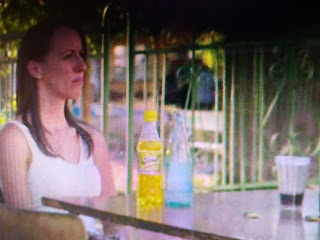"Every stone has its place" says quarry manager Adrian (Syuleyman Alilov Letifov) to his new friend and 'bodyguard' Meinhard (Meinhard Neumann) as he teaches him how to build a dry stone wall. But is there a place for stone faced Meinhard himself, a taciturn loner whose weathered features sketch the outline of a story that Meinhard's few words fail to colour in?
Despite Bulgaria being far more commonly associated with the adjective 'Eastern', Valeska Grisebach's new film Western has a highly befitting title. Not only does it have many of the hallmarks of the classic Hollywood western:- a group of men arrive at a strange village where the locals, possibly correctly, distrust their intentions, wild expanses of countryside, a horse being treated with more respect than most of the women, and the threat of violence constantly lingering beneath the surface. Why, in some places it's even a tiny bit boring. Just like a proper western.
It's also a 'western' of a different stripe in that it deals with how the Western nations of Europe can sometimes mine, exploit, and misunderstand the Eastern nations of Europe. Meinhard's joined a team of German labourers sent to southern Bulgaria, near the Greek border, to build a hydroelectric plant to provide infrastructure for a poor, rural part of the country. He soon finds himself at loggerheads with his foreman Vincent (Reinhardt Wetrek), a boorish, incurious, bully whose woeful attempts at flirtation with local woman Viara (Vyara Borisova) demonstrate a complete lack of cultural sensitivity and stokes further the already latent tensions between the Bulgarian villagers and the visiting German workers.
As Vincent, and the fairly sketchily drawn other Germans, sunbathe, drink, banter, and, occasionally, do some work, Meinhard finds himself spending more and more time with the Bulgarians in the village. They exchange cigarettes and beers as Meinhard is taught not only how to build a dry stone wall but how to bridle a horse and how to thread and dry tobacco leaves. Some, like Adrian and Veneta (Veneta Frangova), are friendly. Others much less so. Meinhard finds himself on the receiving end of violence more than once.
Meinhard says he's a former Legionnaire and allows others to believe he's killed but, in reality, we don't know where he's come from and we don't know where he's going. He says he's come to Bulgaria to work, to earn money, but is he escaping something in Germany? Is he escaping his past? As he attempts to keep one foot in the German camp and another in the Bulgarian one his loyalties are tested time and again and he soon becomes the subject of distrust by elements of both groups. His walks home at night, through badly marked paths in the gloaming, are accompanied with as much a sense of dread as his days are by a chorus of cicadas.
This is more a character study than it is a narrative driven piece of film making. There are many men out there at the moment taking stick, correctly, for mansplaining and telling women how to do their feminism correctly so as a female director it would seem that Grisebach needs to pitch her study into masculinity just right or risk copping some flak herself. To her credit she pulls it off with no little panache. As the lesser characters make macho boasts about guns and fighting, she paints Vincent as a man whose browbeating nature stems from his own insecurity and lets us see that young Vanko's juvenile outbreaks of violence are just his way of announcing his entrance into the world of adulthood. He's just copying the big boys.
The crisis of masculinity is most explicit in its violence but is borne from the lack of connection, the inability to talk to each other. It's not just the language barrier, when all the Germans are together awkward silences still hang in the air with all the weight of a pregnant rain cloud, but that certainly adds to the tension. We can read the subtitles so we know what each character is saying even when they don't understand each other. As ever, in these circumstances, mimes are used to convey vital information and it seems that when people really want to understand each other they find a way.
One fairly guaranteed form of language free expression would be sex, you might think, but the only moment of genuine intimacy in the film, like so many others, proves to be fleeting. While not lacking passion it turns out to be just two people, lost in their own lives, enjoying a brief moment of togetherness and communion. At one point in the film a gift of a pen knife is returned unwanted. It's sad but nothing is said. The gift of love, too, seems to have been treated equally casually.
It's a beautifully shot, slightly overlong, film that slowly, but surely, prises away at the lid that men (try to) keep on (some of) their feelings. Kevin Bashev (as Vanko), Borisova, and Letifov all deserve immense credit for their performances and Wetrek does a brilliant job in bringing such depth to a character like Vincent who on the surface has none. But most of all the plaudits need to go to Neumann for his tour de force as Meinhard and Grisebach herself for having the nous to bring together this cast (none of these people had ever acted in a film before, amazingly) and for having such a clear idea of what she wanted to achieve in a film and bringing that to fruition. It's safe to say she put in a longer shift than some of her workshy characters.








No comments:
Post a Comment